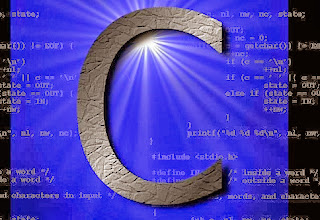The string in C programming language is a one-dimensional
array of characters which is terminated by a null character '\0'. Thus a
null-terminated string contains the characters that comprise the string
followed by a null.
The declaration and initialization for creating a a word
"World".To determine the end of the string ,there is a symbol ('\0')
at the end of the array which means null character.
char greeting[6] = {'W', 'o', 'r', 'l', 'd', '\0'};
The declaration of a string in C Programming language is:
The memory
presentation of above defined string in C Programming language is:
String Presentation in C:
You not need to place the null character at the end of a
string by yourself. The C compiler automatically places the '\0' at the end of
the string when it initializes the array.
#include <stdio.h>
int main ()
{
char greeting[6] =
{'H', 'e', 'l', 'l', 'o', '\0'};
printf("Greeting message: %s\n", greeting );
return 0;
}
Output:
Greeting message: Hello
C Provide a wide range of functions that manipulate
null-terminated strings:
S.N. Function
& Purpose
1strcpy(s1,
s2); Copies string s2 into string s1.
2strcat(s1,
s2); Concatenates string s2 onto the end of string s1.
3strlen(s1); Returns the length of string s1.
4strcmp(s1,
s2); Returns 0 if s1 and s2 are the same; less than 0 if s1<s2; greater than 0 if s1>s2.
5strchr(s1,
ch); Returns a pointer to the first occurrence of character ch in
string s1.
6 strstr(s1,
s2); Returns a pointer to the first occurrence of string s2 in
string s1.
#include <stdio.h>
#include <string.h>
int main ()
{
char str1[12] =
"Hello";
char str2[12] =
"World";
char str3[12];
int len
;
/* copy str1 into
str3 */
strcpy(str3, str1);
printf("strcpy( str3, str1) :
%s\n", str3 );
/* concatenates
str1 and str2 */
strcat( str1,
str2);
printf("strcat( str1, str2):
%s\n", str1 );
/* total lenghth of
str1 after concatenation */
len = strlen(str1);
printf("strlen(str1) :
%d\n", len );
return 0;
}
OutPut:
strcpy( str3, str1) :
Hello
strcat( str1, str2):
HelloWorld
strlen(str1) : 10
|
|||
| C - Overview | |||
| C - Basic Syntax | |||
| C - Data Types | |||
| C - Variables | |||
| C - Constants | |||
| C - Storage Classes | |||
| C - Operators | |||
| C - Decision Making | |||
| C - Loops | |||
| C - Functions | |||
| C - Scope Rules | |||
| C - Arrays | |||
| C - Pointers | |||
| C - Strings | |||
| C - Structures | |||
| C - Unions | |||
| C - Bit Fields | |||
| C - Typedef | |||
| C - Input & Output | |||
| C - File I/O | |||
| C - Preprocessors | |||
| C - Header Files | |||
| C - Type Casting | |||
| C - Error Handling | |||
| C - Recursion | |||
| C - Variable Arguments | |||
| C - Memory Management | |||
| C - Command Line Arguments |
Tuesday, 26 November 2013
Home »
C language
» String In C












0 comments:
Post a Comment